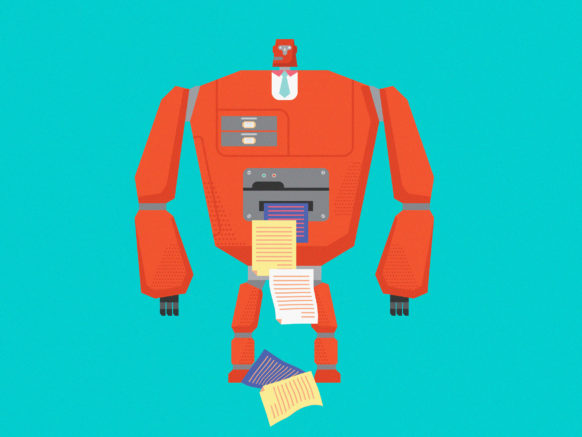Let’s take a breath
copyright by www.wired.com
Robots and artificial intelligence systems are nowhere near displacing the human workforce. Nevertheless, no less a voice than Bill Gates has asserted just the opposite and called for a counterintuitive, preemptive strike on these innovations. His proposed weapon of choice? Taxes on technology to compensate for losses that haven’t happened.
Disrupting growth and innovation
AI has massive potential. Taxing this promising field of innovation is not only reactionary and antithetical to progress, it would discourage the development of technologies and systems that can improve everyday life. Imagine where we would be today if policy makers, fearing the unknown, had feverishly taxed personal computer software to protect the typewriter industry, or slapped imposts on digital cameras to preserve jobs for darkroom technicians. Taxes to insulate telephone switchboard operators from the march of progress could have trapped our ever-present mobile devices on a piece of paper in an inventor’s filing cabinet.
Taxes may not save your job
There simply is no proof that levying taxes on technology protects workers. In fact, as former US treasury secretary Lawrence Summers recently wrote , “Taxes on technology are more likely to drive production offshore than create jobs at home.” Calls to tax AI are even more stunning because they represent a fundamental abandonment of any responsibility to prepare employees to work with AI systems. Those of us fortunate enough to influence policy in this space should demonstrate real faith in the ability of people to embrace and prepare for change. The right approach is to focus on training workers in the right skills, not taxing robots.
Give students adequate education
There are more than half a million open technology jobs in the United States, according to the Department of Labor, but our schools and universities are not producing enough graduates with the right skills to fill them. In many cases, these are “new collar jobs” that, rather than calling for a four-year college degree, require sought-after skills that can be learned through 21st century vocational training, innovative public education models like P-TECH (which IBM pioneered), coding camps, professional certification programs and more. These programs can prepare both students and mid-career professionals for new collar roles ranging from cybersecurity analyst to cloud infrastructure engineer […]
read more – copyright by www.wired.com


Let’s take a breath
copyright by www.wired.com
Robots and artificial intelligence systems are nowhere near displacing the human workforce. Nevertheless, no less a voice than Bill Gates has asserted just the opposite and called for a counterintuitive, preemptive strike on these innovations. His proposed weapon of choice? Taxes on technology to compensate for losses that haven’t happened.
Disrupting growth and innovation
AI has massive potential. Taxing this promising field of innovation is not only reactionary and antithetical to progress, it would discourage the development of technologies and systems that can improve everyday life. Imagine where we would be today if policy makers, fearing the unknown, had feverishly taxed personal computer software to protect the typewriter industry, or slapped imposts on digital cameras to preserve jobs for darkroom technicians. Taxes to insulate telephone switchboard operators from the march of progress could have trapped our ever-present mobile devices on a piece of paper in an inventor’s filing cabinet.
Taxes may not save your job
There simply is no proof that levying taxes on technology protects workers. In fact, as former US treasury secretary Lawrence Summers recently wrote , “Taxes on technology are more likely to drive production offshore than create jobs at home.” Calls to tax AI are even more stunning because they represent a fundamental abandonment of any responsibility to prepare employees to work with AI systems. Those of us fortunate enough to influence policy in this space should demonstrate real faith in the ability of people to embrace and prepare for change. The right approach is to focus on training workers in the right skills, not taxing robots.
Give students adequate education
There are more than half a million open technology jobs in the United States, according to the Department of Labor, but our schools and universities are not producing enough graduates with the right skills to fill them. In many cases, these are “new collar jobs” that, rather than calling for a four-year college degree, require sought-after skills that can be learned through 21st century vocational training, innovative public education models like P-TECH (which IBM pioneered), coding camps, professional certification programs and more. These programs can prepare both students and mid-career professionals for new collar roles ranging from cybersecurity analyst to cloud infrastructure engineer […]
read more – copyright by www.wired.com
Share this: